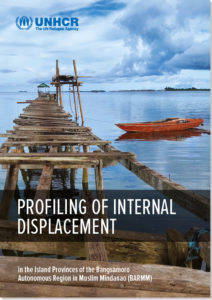
Go to the full report to read the detailed analysis, insights and recommendations.
Internal displacement is typically thought of as people and families being forced miles far away from their places of origin, compelled to rethink their lives in the places of refuge. However, in some instances, people are displaced within the same province. In the case of Philippines’ southern Bangsamoro Autonomous Region of Muslim Mindanao (BARMM), many are even displaced within their own municipality or barangay (neighbourhoods within municipalities), not too far from their home. The just-launched profiling report brings attention to the situation of internally displaced persons in the island provinces of Basilan, Sulu and Tawi-Tawi of the BARMM (BaSulTa provinces). It contributes to the broader understanding that regardless of the distance migrated, forced displacement causes or increases vulnerabilities, often resulting in the adoption of negative coping mechanisms and affecting living conditions and pre-existing social dynamics in hosting communities.
The profiling exercise also sheds light on a region that, despite the impacts of the longstanding conflict, has been little considered in humanitarian and development interventions. Contributing factors include the remoteness of the island provinces, but also the closeness to Mindanao, which has been attracting most of the attention and resources due to deep-rooted tensions.
In addition to internal displacement, the profiling exercise also looked at the Sama Bajau, a population group living on Bongao, Tawi-Tawi, and known to be at risk of statelessness. The results and recommendations from this analysis are captured in a separate report. The profiling exercise was coordinated by the Profiling Working Group led by UNHCR Philippines, the Ministry of Social Services and Development (MSSD) and the Ministry of the Interior and Local Government (MILG) of the BARMM region. JIPS provided technical support throughout the process, including methodology design, stakeholder engagement, tools development, analysis, reporting and dissemination.
Bearing a history of ethno-religious diversity and conflict, exacerbated by a colonial influence, the southern region of Mindanao and the islands of Basilan, Sulu and Tawi-Tawi (BaSulTa provinces) have long sought institutional recognition of their identity in the Philippines. The Bangsamoro Autonomous Region of Muslim Mindanao (BARMM) was established in 2019, following a peace agreement between the opposing parties. However, the situation remains fragile with an ongoing conflict due to the presence of armed groups and continued violence recognised as the major cause of internal displacement, and is aggravated by recurring natural disasters such as typhoons and storm surges.
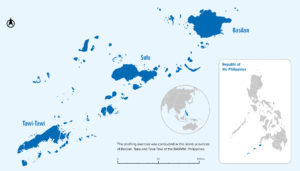
Map of BaSulTa southern provinces. © UNHCR
Security risks, limited access to the islands and insufficient funds have also impeded governmental and international humanitarian efforts in the delivery of aid to IDPs in the BaSulTa provinces. Moreover, despite the existence of national laws and policies stipulating the protection and assistance to IDPs, so far there has not been an in-depth understanding of the displacement situation and possible durable solutions in the island provinces due to the lack of comprehensive and agreed-upon data.
Against this background, UNHCR together with the Ministry of Social Services and Development (MSSD) and the Ministry of the Interior and Local Government (MILG) of the BARMM initiated a consultative process involving stakeholders from the provincial, municipal and barangay local government units, UN agencies, civil society organisations, academia, security sectors and IDP leaders to discuss the need for, and ultimately commitment to, a collaborative profiling exercise. During our mission in October 2019, the collaborative platform was established and the exercise initiated. Although the COVID-19 pandemic outbreak impacted the timeline of the whole process, the report was successfully finalised in February 2021.
JIPS’ technical support was made possible thanks to the generous support of the American people through contributions from the Bureau for Humanitarian Assistance (BHA) of the United States Agency for International Development (USAID), and the Danish Development Cooperation Agency (DANIDA).
The overall purpose of the profiling was to obtain reliable and comprehensive evidence on the situation of the IDPs in the BaSulTa provinces. The exercise also investigated patterns and causes of displacement, as well as the purpose, frequency and obstacles for IDPs to visit the places of habitual residence. The results feed into the government’s and the humanitarian agencies’ planning and design of evidence-based responses tailored to the needs of the displacement-affected population groups. The findings of the profiling also serve as a basis for advocacy efforts to mitigate protection risks, raise awareness of the impacts of displacement, and promote further assistance.
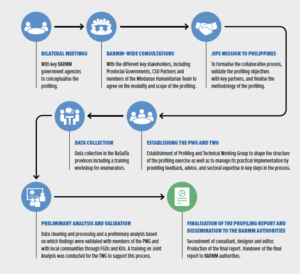
The process of the BaSulTa profiling exercise, starting with the consultative process and culminating in the joint profiling report launched in July 2021.
The Profiling Working Group was in charge of the coordination of the exercise and worked collaboratively to manage and implement the exercise, including by providing sectoral expertise at key steps of the process. The below infographic gives an overview of the key steps in the profiling process. The profiling exercise focused on two population groups:
A mixed-methods approach was used, with both a quantitative and a qualitative component: a household-level survey was conducted with a sample of each of the target population groups per province. The final sample counted 1,653 families (7,692 individuals). The questionnaire used as a basis the Interagency Durable Solutions Indicator Library, and was developed jointly with the PWG and in consultation with the sectoral experts in order to identify locally relevant questions.
No reliable baseline data were available, and while IDP lists could be obtained for the different provinces, they were not all up-to-date. To mitigate these challenges, the sampling approach relied on a full-count/snowballing strategy (for an explanation see JIPS’ Sampling Guide for Displacement Situations, pg.19).
The qualitative data collection consisted of focus group discussions with IDPs and a validation survey with the PWG, to ground-truth the preliminary results from the household survey with members of the displaced communities and representatives of the local government units in each of the provinces.
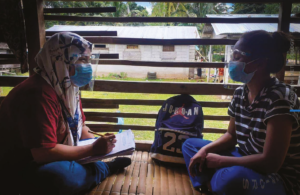
©UNHCR
Six recommendations were developed and submitted to the BARMM Government in support of displacement-affected communities:
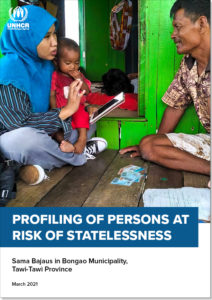
Go to the full report to read the detailed profiling results on the Sama Bajau.
The collaborative profiling exercise implemented in the BaSulTa provinces also looked at the Sama Bajau population in Bongao, Tawi-Tawi. They are one of the State-identified populations at risk of statelessness in the Philippines, due to their itinerant lifestyle and generations of non-registration of birth.
The findings in Tawi-Tawi indicate that 85% of the surveyed home-based displaced families and 86% of the families in temporary shelters belonged to the Sama Bajau ethnolinguistic group.
Displacement-affected families from the Sama Bajau were found to be specifically exposed to discrimination, for instance finding only low-paid irregular or seasonal work with fishing being their traditional source of income. Their children were found to be targets of bullying in schools, which leads to a lower attendance rate as compared to other population groups.
The dedicated profiling report provides baseline information for stakeholders and duty bearers to craft policies and interventions. It also informs advocacy initiatives to mitigate protection risks and raise awareness on the impact of statelessness for the Sama Bajaus residing in Bongao, Tawi-Tawi.